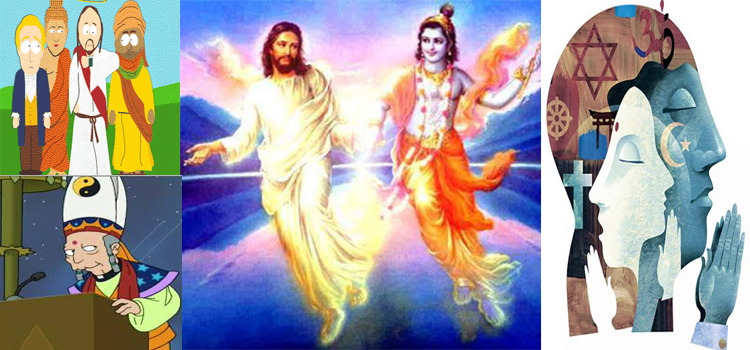Observations by someone who grew up in the stifling atmosphere of dogmatic Christianity and appreciates the freshness and freedom of undogmatic Hinduism– and wonders why a section of Hindus are so apologetic about their religion when it actually is the best bet for a fulfilling life.
Hindus used to say, “All religions are equal”. They did not want to see that the two biggies, Christianity and Islam, did not agree. Each of those religions claimed for itself, “We alone are the only true religion. Our God is the only true God.” They pitied Hindus that they might actually believe that by stating that all religions are equal, Hinduism would be elevated to their level. Of course, the ‘true religions’ will never allow this.
Now Hindus say, “We respect all religions. We teach it to our children. Our children hear a lot about Christianity and Islam and how good these religions are. We don’t want to offend anyone, so we teach very little about Hinduism and what we teach is only about superficial things, like festivals and customs and not about the deep philosophy and scientific insights which would portray Hinduism in a good light and might irritate other religions.”
Again, Hindus don’t want to see that Christianity and Islam do not respect Hinduism. The clergy of those religions don’t say it into their face, but to their own flock: “Hindus go to hell, if they don’t convert to the true religion. It is their own fault. We have told them about Jesus and his Father or the Prophet and Allah respectively. Still, they are so arrogant and foolish and hold on to their false gods. But God/Allah is great. He will punish them with eternal hellfire.”
In a variation of “We respect all religions” Hindus also say, “All religions teach the human being to be virtuous and good and lead him to God, the creator. Hindus attend Inter Faith Dialogues and try to find the commonalities. Of course these are there. Hindus try to build on them. “Yes, all religions have good points. Yes, all religions have good people.” They keep repeating that all religions teach goodness, as if to convince themselves. However, deep down, Hindus know that this is not honest and lacks intellectual integrity. They know that Christianity and Islam have gone off track by preaching exclusiveness and hate to their flock. Those religions have encouraged persecution of others and brainwashed otherwise kind human beings into fighting for an imaginary god who supposedly hates all those ‘others’ who don’t believe, what they are told to believe. They have left a trail of bloodshed in history. But Hindus choose to ignore it. ‘Why provoke unnecessarily?’ they might feel, still betraying a psyche wounded by thousand years of oppression.
Is it not time that Hindus call a spade a spade? Swami Vivekananda has said that every Hindu who leaves his faith is not one Hindu less but one enemy more. He said this while India was ruled by the British, and Christians and Muslims were encouraged to feel superior to the “idol worshipping Hindu”. Hindus were not in a position to put the record straight, as their own elite put Hinduism down due to a malicious British education policy. Yet today, 66 years after independence, it is about time to tell the world loudly and boldly what Hinduism is about.
It is not about ruling the world. It is not about believing in unverifiable dogmas. It is not about being nice to those of one’s own faith and not nice to those of other faiths. But it is about discovering what we really are, apart from the ever-changing body and mind. The ancient rishis have discovered the oneness underlying the apparent multiplicity, long before western scientists did. This conscious, blissful oneness is not somewhere out there. It is permeating everyone (and everything) and can be felt as one’s own essence. This essence can be called by different names, but the main thing is, that it is within everyone and within everyone’s reach. So, we truly are all children of the same infinite divine Presence. We all belong to one big family. Vasudhaiva Kutumbhakam. This truth provides the basis for a harmonious world and it makes sense, or does it not?
by Maria Wirth































